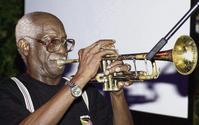Andre Jebbinson, Staff Reporter
Sony Bradshaw
He is on the stage in his prime with an audience that adores him. The crowd easily and willingly move to all his beck and call; he is on top of the world. He is their superstar.
A few years have passed and his better days are behind him. The once constant source of cash is no more and instead, he has to rely on what he stashed away during his heyday and whatever investment he might have made. This would seem like the ideal situation for someone who made plans for the future. Unfortunately, not all entertainers plan for the day when their health may fail.
A call reaches home to alert his loved ones he has died suddenly. The panic of the death alone will cause hearts to bleed, but then there are also the funeral costs and sustaining a family that depended on the superstar.
According to the Jamaica Federation of Musicians, JFM, this does not have to be the case.
"The problem is entertainment workers don't have a job at a place where they can just take out the money. The needto ensure they take care of that," said Sonny Bradshaw, past president of the federation who heralded the union.
This is why close to the end of his tenure, he started to implement a union that was mandatory for the JFM members. A prime example of what can happen with is Don Drummond.
According to Bradshaw, the JFM took on Drummond's funeral expenses because he was an integral part of Jamaican music. At the same time, he urged other musicians to take the initiative and safeguard their unpredictable future.
Raise the dues
It is currently being proposed that the federation's yearly dues be raised from $2,000 to $4,000. JFM vice-president, Winston Braham, thinks the amount is very reasonable and he cannot understand why some entertainers, musicians would refuse to pay. Complying with payment would mean that the member of the federation will automatically have life insurance.
"This type of industry is a high-risk industry. They travel around the world and they leave their family at home. They are not concerned that something can happen while they are away," he said.
"They have this concept that is we in the office benefit, but we don't get a red cent. We only do it because we love the music and the people who do it,"
According to Braham, the bulk of members are older artistes. There are, however, times when member countries of the International Federation of Musician Unions (IFMU) can randomly demand artistes and musicians to be insured before they are allowed to perform in their countries.
The United States, Canada, United Kingdom, France, Japan, among others, are all members of the international federation.
Only then, do some bother t themselves with the union. Once the paid period is over, they usually do not renew until they need to travel again.
"You have some upcoming persons who need guidance and information more often and so they become members. When they reach a certain level, they think they don't need it anymore," said Desmond Young, president of JFM.
They need insurance
The JFM provides its life insurance through Guardian Life Ltd. Emma Thomas, vice-president of sales and marketing, also weighed in on the necessity of life insurance.
"Entertainers like anybody else need insurance and we try to see what persons need. They have to travel and we take all those risks into consideration," Thomas said.
With that in mind, there is no cap on how much insurance can cost for any entertainers or musicians, but the maximum amount that can be claimed stands as $3 million. The company will pay full compensation if a death occurs accidentally and will pay 50 per cent for the loss of a limb or an eye. In a case where both hands, eyes or feet are lost, the policy covers 100 per cent.
The Sunday Gleaner made a few attempts to speak with entertainers and musicians about whether they had life insurance. It turned out that many found the idea revolting.
Both Bradshaw and Braham are urging those in industry to better plan for what is sometimes inevitable. They can only provide their service, but cannot force the those in the industry to join.
"They should realise who is dying nowadays. It is not only the older people are dying. They need to make sure they can provide for themselves and those who they might leave behind," Braham said.
andre.jebbinson@gleanerjm.com
Rudolph Brown/Chief Photographer
Desmond Young, president of the Jamaica Federation of Musicians.

